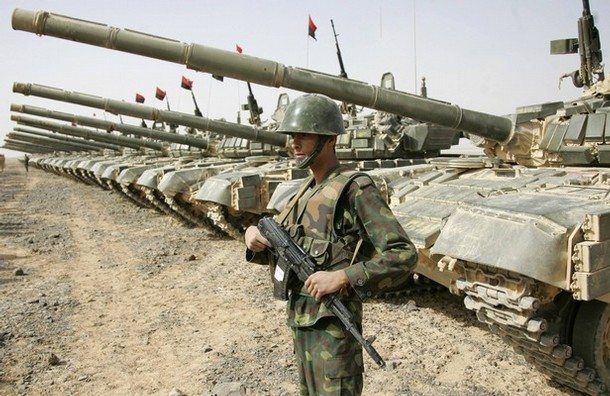Tanks were deployed in Yemen’s capital on Monday as a dangerous split opened in the military leadership after top generals joined the revolt against President Ali Abdullah Saleh’s regime.
As some of his closest military and tribal allies abandoned him, Saleh refused to submit to calls for his resignation and claimed he had the support of the vast majority of people in the impoverished Arabian Peninsula country.
“We’re still here… the great majority of the Yemeni people are with security, stability and constitutional law,” he said.
“Those who are calling for chaos, violence, hate and sabotage are only a tiny minority.”
Tanks took up position in key locations across Sanaa including at the presidential palace, the central bank and the defence ministry, but it was unclear what their orders were or who was in charge.
A statement from the country’s military command late Monday said it remained loyal to Saleh and would not allow “any attack on democracy and the constitutional order.”
“The armed forces announce that they remain faithful to their oath to the political leadership, directed by President Saleh,” the statement said.
In another blow, Sanaa’s ambassadors to Egypt and the Arab League also defected to join the protest movement.
In the first of the day’s body blows to Saleh’s authority, General Ali Mohsen al-Ahmar, commander of the Northwest Military District which includes Sanaa, announced he had joined the “revolution.”
“The crisis is getting more complicated and it’s pushing the country towards violence and civil war,” he said in a statement.
“According to what I’m feeling, and according to the feelings of my partner commanders and soldiers… I announce our support and our peaceful backing to the youth revolution.
“We are going to fulfil our duties in preserving security and stability.”
One by one, dozens of officers of various ranks stood at the tent city near Sanaa University, where demonstrators have kept vigil since February 21 in spite of a wave of attacks, and publicly pledged support for the revolt.
Eastern Military district chief General Mohammed Ali Mohsen also threw his support behind the protesters, as did at least two other generals, Nasser Ali Shuaybi in Hadramawt province and Faisal Rajab in southern Lahij province.
Sadiq al-Ahmar, who leads the Hashid tribal federation, the largest in deeply tribal Yemen and a crucial source of Saleh’s power, told Al-Jazeera television it was time for the embattled president to quit.
“I announce in the name of all the members of my tribe that I am joining the revolution,” Ahmar said, calling for Saleh “to exempt Yemen from the bloodshed and make a quiet exit.”
The regime was internationally condemned after more than 50 people were killed on Friday when loyalist gunmen fired on thousands of protesters in Sanaa from rooftops.
The deputy speaker of parliament, Himyar al-Ahmar, and the governor of the key southern province of Aden, Ahmed Qaatabi, resigned on Monday in protest at the treatment of demonstrators.
The government has already lost the support of religious leaders and been weakened by the resignations of ministers, ambassadors and a host of ruling party MPs, but Saleh has refused to stand down until his term ends in 2013.
He sacked his cabinet on Sunday in a bid to placate opposition calls for sweeping reforms in the key US ally.
As the pillars of his power buckled beneath him, Saleh sent Foreign Minister Abu Bakr al-Kurbi on an urgent mission to Saudi Arabia with a secret message for the king, the state news agency reported.
In Cairo, Saleh’s envoys to Egypt and the Arab League abandoned him.
Abdel Wali al-Shemiri and Abdel Malek Mansur “have joined the revolutionaries (but) continue to represent the Yemeni people in Egypt and at the Arab League,” a diplomat told AFP on condition of anonymity.
The defection of senior military officers to the opposition is likely to complicate Washington’s support for Saleh, whom it sees as a guarantor of stability in a volatile country and a partner in the war against Al-Qaeda.
The White House said on Monday it has told the Yemeni government that the violence seen in Sanaa is “unacceptable” while French Foreign Minister Alain Juppe said Saleh was facing an “unavoidable” exit.
US special forces are training Yemeni anti-terror units engaged against Al-Qaeda in the Arabian Peninsula (AQAP), which has allegedly attempted several attacks on US targets.
UN Secretary General Ban Ki-moon, after talks in Cairo with Arab League chief Amr Mussa, strongly condemned the use of live ammunition against Yemen demonstrators, and repeated international calls for dialogue and restraint.










